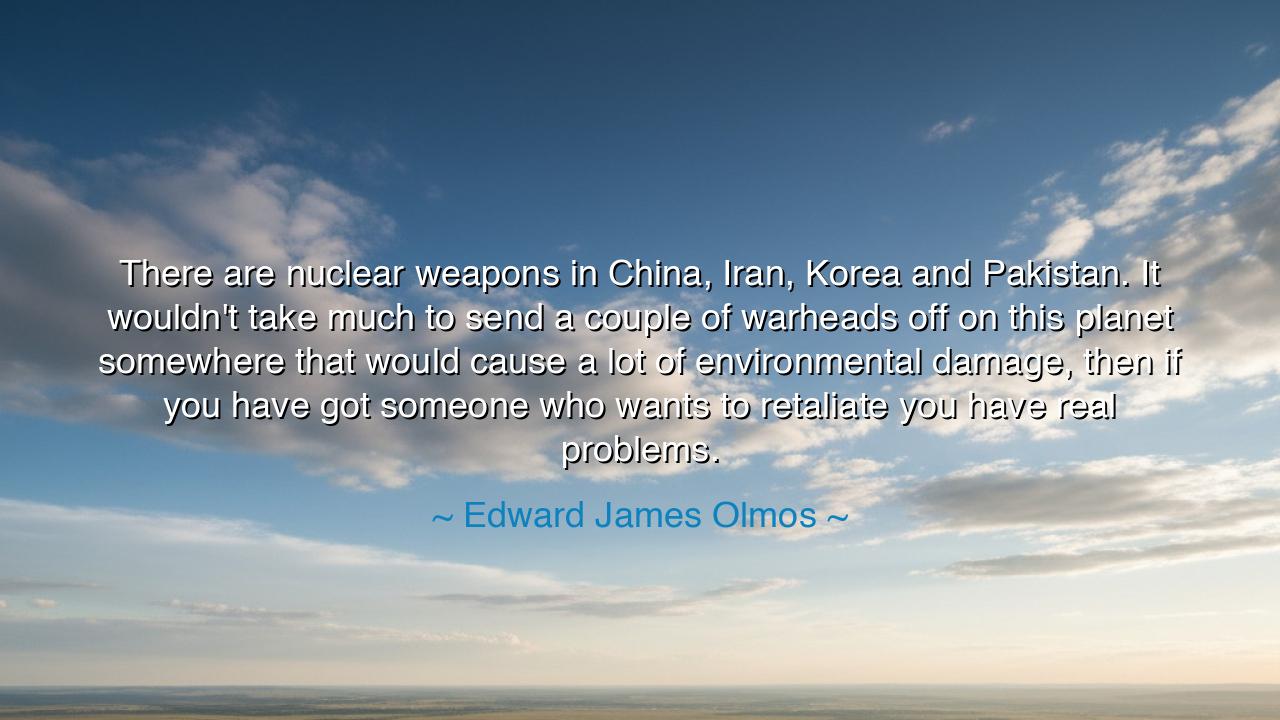
There are nuclear weapons in China, Iran, Korea and Pakistan. It
There are nuclear weapons in China, Iran, Korea and Pakistan. It wouldn't take much to send a couple of warheads off on this planet somewhere that would cause a lot of environmental damage, then if you have got someone who wants to retaliate you have real problems.






The words of Edward James Olmos, “There are nuclear weapons in China, Iran, Korea and Pakistan. It wouldn't take much to send a couple of warheads off on this planet somewhere that would cause a lot of environmental damage, then if you have got someone who wants to retaliate you have real problems,” thunder with the tone of prophecy and warning. They remind us that humanity has woven a crown of fire for itself, and that this crown, if ever placed upon the world’s head, would bring not glory but ruin. In this statement, Olmos speaks not as an actor alone but as a witness of history, as one who perceives that the greatest threat to our age is not only destruction by war, but the slow poisoning of the earth itself by the weapons we have made.
The origin of this saying lies in the late twentieth and early twenty-first centuries, when the spread of nuclear weapons beyond the original powers raised new fears of instability. Unlike the Cold War standoff between the United States and the Soviet Union, where the doctrine of “mutually assured destruction” held two giants in check, the arrival of nuclear capability in China, Iran, Korea, and Pakistan meant a more fractured and volatile world. Olmos saw that in such an environment, even a single miscalculation, even one act of vengeance or pride, could unleash devastation not only upon peoples but upon the environment that sustains them.
History gives us a chilling example in the tragedy of Hiroshima and Nagasaki. In August 1945, two atomic bombs fell upon Japan, ending a war but opening a new era. The fireballs leveled cities, killed tens of thousands in an instant, and left survivors haunted by radiation sickness and poisoned lands. Though these bombs were but shadows of the weapons we now possess, they revealed the truth Olmos warns of: that nuclear war is not only about nations and armies, but about rivers, forests, skies, and generations unborn. One detonation scars the land for decades; many would scar the earth for centuries.
The deeper meaning of Olmos’s words is that the danger of nuclear arms lies not only in their numbers but in the chain of retaliation they unleash. One warhead fired invites another in return. One nation’s rage kindles another’s vengeance. And soon, what began as a single act of destruction grows into a storm consuming the planet. The environment—silent, defenseless, unable to strike back—becomes the greatest victim of this exchange, and with it, the human race itself. The cycle of retaliation is thus not only political but apocalyptic, for it destroys the very ground from which life springs.
Yet in his words there is also a plea: that we must not imagine such events as distant or impossible. Olmos warns us that “it wouldn’t take much”—a mistake, a provocation, a leader blinded by anger—to unleash this horror. The lesson is one of vigilance, humility, and restraint. Humanity must step back from the precipice, recognizing that the earth cannot endure the pride and fury of nations forever. To wield fire is dangerous; to wield the fire of the atom is to risk consuming the whole of creation.
The lesson for us, then, is to labor for peace with all our strength. Support leaders and policies that reduce weapons rather than multiply them. Speak against the pride that glorifies war. Teach future generations that security is not found in the stockpiling of fire, but in the cultivation of trust, dialogue, and cooperation. In our own lives, though far removed from nuclear arsenals, we can nurture peace by refusing the poison of vengeance, by living in harmony with others, and by remembering always that destruction, once unleashed, is far easier to begin than to end.
Therefore, let us live with the wisdom of guardians, not the recklessness of children. Let us understand that in the age of nuclear fire, the fate of the earth hangs by threads of restraint and compassion. One spark may ignite a conflagration, but one act of patience, one refusal to retaliate, may preserve the world.
So let Olmos’s words endure across generations: “It wouldn’t take much to cause a lot of environmental damage… then if you have got someone who wants to retaliate you have real problems.” They are not merely a warning but a call to responsibility. Let us take them to heart, that the fire we have created remains forever contained, and that the earth, our only home, may continue to shelter life in peace.






AAdministratorAdministrator
Welcome, honored guests. Please leave a comment, we will respond soon